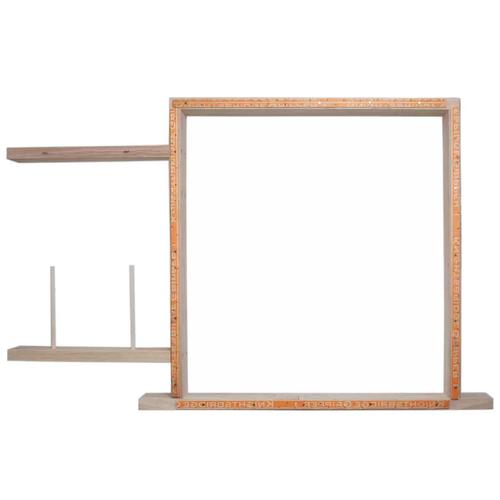Your tufting frame is the foundation of your rug-making process. If it’s not sturdy enough or properly sized, your fabric won’t stay tight, and tufting will become frustrating.
With so many options available—store-bought or DIY—which one should you choose? Let’s explore the best tufting frames and how to build one yourself!

1️⃣ Comparing Tufting Frames – Which One is Best?
| Type | Pros | Cons | Best For |
|---|---|---|---|
| Pre-Made Tufting Frames | Easy setup, sturdy, well-tensioned fabric | Expensive, limited sizes | Beginners who want a hassle-free start |
| DIY Wooden Frames | Affordable, customizable size | Requires tools, manual labor | People who like DIY projects & want to save money |
| PVC Pipe Frames | Lightweight, portable, easy to build | Less sturdy, fabric may loosen over time | Temporary setups & small rugs |
| Adjustable Metal Frames | Can change size, long-lasting | Expensive, heavy | Professionals & frequent tufters |
💡 Best Choice: For most people, a DIY wooden frame is the best balance between affordability and durability.
2️⃣ How to Choose the Right Tufting Frame for You
📌 Key Factors to Consider:
✔ Size: Should match the maximum rug size you plan to tuft.
✔ Sturdiness: A wobbly frame will make tufting difficult.
✔ Adjustability: Some frames allow you to change size for different projects.
✔ Ease of setup: DIY frames require more work than store-bought ones.
📌 Best Options for Different Needs:
✔ For large rugs: A sturdy wooden or metal frame is best.
✔ For small rugs & beginners: A PVC or pre-made frame works well.
✔ For budget-conscious tufters: DIY wooden frames are the best option.
3️⃣ DIY Guide – How to Build a Tufting Frame
📌 Materials You Need:
✔ 4 wooden planks (2×4 inches)
✔ Wood screws & drill
✔ Clamps or staple gun
✔ Non-slip carpet grippers (to hold the fabric)
📌 Step-by-Step Instructions:
1️⃣ Cut the wood to your preferred size (e.g., 36×48 inches for medium rugs).
2️⃣ Assemble a rectangle frame and secure it with screws.
3️⃣ Attach carpet grippers or clamps to hold the fabric tightly.
4️⃣ Secure the frame to a table or stand for stability.
💡 Pro Tip: If you plan to tuft frequently, reinforce the frame corners with metal brackets for extra stability.
4️⃣ Common Tufting Frame Problems & How to Fix Them
🚨 Issue: Fabric Is Too Loose
✅ Use strong clamps or staple the fabric securely.
🚨 Issue: Frame Wobbles While Tufting
✅ Ensure the frame is secured to a table or stand.
🚨 Issue: Fabric Slips During Tufting
✅ Attach carpet grippers or a rubber strip along the edges.
💡 Pro Tip: Always test your frame setup before starting a project to avoid frustrations.
5️⃣ Final Thoughts – Choosing the Best Tufting Frame for You
📌 Quick Recap:
✅ Buy a pre-made frame for an easy start.
✅ Build a DIY wooden frame for affordability & custom size.
✅ Avoid wobbly frames by reinforcing them properly.
✅ Use strong clamps or carpet grippers to keep fabric tight.
Now, you’re ready to set up your perfect tufting frame! 🚀✨
